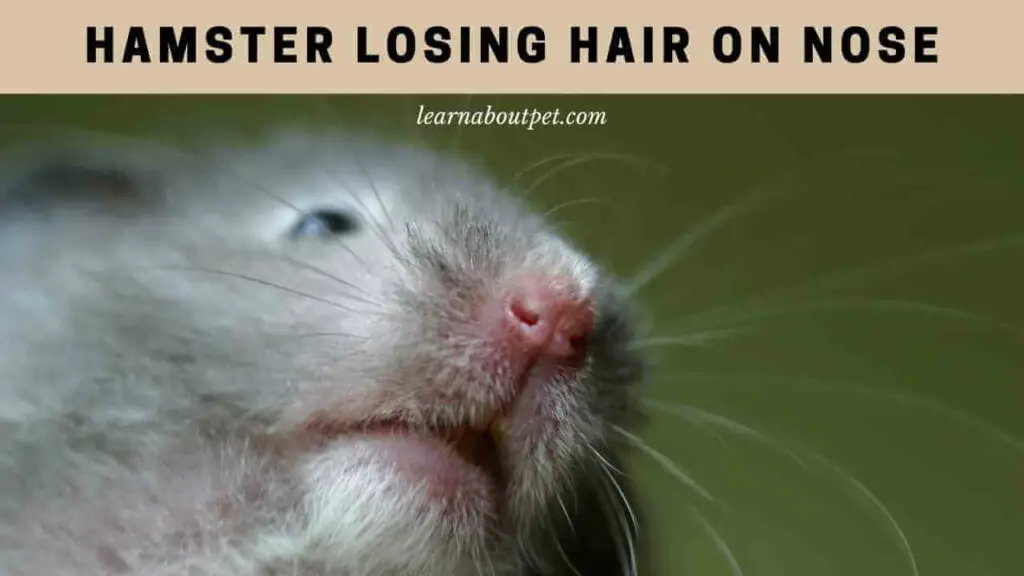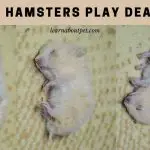Discovering that your hamster is losing hair on its nose can cause you considerable distress. You will want to know what may be causing the hamster to lose hair on the nose.
Why is my hamster losing hair on nose? Hamsters lose hair on their noses as a result of chewing on their cages’ bars. But we also have cases where the hair loss may be as a result of bites from parasites such as mites, ticks and ringworms (as well as fleas). These sorts of parasites make the hamster develop itching. That in turn leads to scratching, which is what may ultimately cause loss of hair.

You will also want to know what you need to do about hamster losing hair on nose. Read on, for answers.
Can Hamsters Lose Hair On Nose?
When you realize that your hamster is losing hair on its nose, the first concern you will probably have is on whether it is normal. In other words, you will want to know, can hamsters lose hair on nose (or is it something that is only happening to your hamster)?
As it turns out, hamsters can lose hair on their noses. Thus, hamster losing hair on nose is quite normal (though not necessarily okay). Indeed, most people who keep hamsters will report having discovered their hamster losing hair on nose at one point or another. Sometimes, the hair loss is bad enough to lead to a wound, which in turn may cause hamster scab on nose.
Therefore if you notice your hamster losing hair on nose, you need to understand that this is something which often happens to other hamsters as well. So it is not unique to your hamster.
Why Is My Hamster Losing Hair On Its Nose?
The most probable reason as to why your hamster is losing hair on its noise is because of bar chewing. Hamsters will often chew on the bars with which their cages are built. In the process of chewing the bars, they end up rubbing their noses (on the upper parts of the bars) so badly that hair loss occurs.
There are rarer cases where the hair loss is attributable to parasite bites. Even rarer are cases where the hair loss is as a result of diseases. The most common culprit is bar chewing.
Upon discovering your hamster losing hair on nose, the most ideal thing to do is examine it closely. You will want to know whether the hair loss is on the nose only or whether it is also present on other parts of the body. This will give you hints on what is causing it.
Where the hair loss is only on the nose, it is mostly likely due to bar chewing. But where it is also present on other parts of the hamster’s body, it could be due to parasites or diseases.
Why Has My Hamster Got A Bald Patch On Its Nose?
Most probably, the hamster has been gnawing on the bars with which its cage is built. In the process, it has rubbed its nose on the bars, leading to the injury/patch.
The bald patch on the hamster’s nose could also be due to parasite bites. But it is unlikely that parasites would only bite the nose and leave other parts of the body. Thus, if the hamster only has a bald patch on its nose, but doesn’t have bite marks on any other part of its body, this is unlikely to be due to parasite bites.
At another level, the bald patch on the hamster’s nose could be due to a disease. But then again, if the baldness is only on the nose, and no other part of the body is affected, this is unlikely to be the case.
We may also be looking at a situation where the bald spot is part of the hamster’s natural muzzle anatomy. So the question here would be whether the bald patch is something the hamster has always had, or it is something the hammie is developing recently.
If it is something that the hamster has always had, it could be part of his natural muzzle anatomy. But if it is something that is developing/something that the hamster has not always had, then it is obviously not part of his muzzle.
All said and done, anyone who discovers their hamster losing hair on nose is advised to first consider the possibility of it being due to cage bar chewing. This applies whether yours is a Djungarian hamster, Robo hamster or any other breed. Bar chewing is very common in all hamsters. And it always leads to nose hair loss, soon or later.
What Should I Do If My Hamster Is Losing Hair On Nose?
The first step, upon discovering your hamster losing hair on nose, is to try to figure out why it is happening. This will entail examining the hamster closely. In doing this, you want to know whether the hair loss is on the nose only (or it is on other body regions as well).
Where the hair loss is on the nose only, the most probable cause is the hamster having been chewing on the cage bars. In this case, you need to understand that the chewing is typically as a result of the desire to keep the teeth from over-growing. At other times, it is due to boredom or anxiety.
You may need to consider providing the hamster with better things to chew upon, in order to keep the teeth from over-growing. There are many wooden block items that can be very useful in this regard. Where the hamster seems to be bar chewing due to boredom, you will need to provide him with more things to occupy his time. Ensure that there are plenty of toys the hamster can play with in the cage. Also ensure that there is a running wheel in the cage.
Where the chewing seems to be due to anxiety, you need to identify what is causing the anxiety. Then get rid of it. For instance, if there is a cat that is always within the hamster’s view, move it away.
You may consider using acrylic sheeting to keep the hamster from accessing the bars, chewing them, and ending up injuring his nose in the process. Alternatively, you may consider using wire mesh to keep the hamster from the cage bars. The hamster may still chew on the mesh. But it probably won’t hurt his nose as badly as the bars.
How Can You Tell Your Hamster Is Dying?
A dying hamster will typically become highly lethargic. Thus, a hamster that was previously hyperactive will become completely inactive. Typically, this sort of hamster will huddle at one corner of its cage. Lethargy in a dying hamster typically comes alongside loss of appetite. The hamster may even not show interest in drinking water.
Diarrhea and lots of wetness in the tail is also quite common in dying hamsters. It is not uncommon for this sort of hammie to have eye discharge. This eye discharge may manifest alongside wheezing and sneezing.
Yet another sign of a dying hamster is hair loss. But this is typically whole body hair loss (and not just hair loss around the nose). Therefore if you discover your hamster losing hair on nose, it is unlikely to be a sign that the hamster is dying – unless it is part of whole body hair loss.
Hamster Acting Strange And Losing Hair On Nose, Now What?
You may be looking at a situation where the hamster is under some sort of distress. So the most important thing is to figure out what is causing anxiety/stress to the hamster, then get rid of it.
Where the situation is particularly bad, you may consider having an exotic pets vet have a look at the hamster. The hamster may be having some sort of internal condition, which is manifesting through hair loss and strange behavior.

How To Cheer Up Hamster Losing Hair On Nose?
Well, one effective strategy to cheer up hamster losing hair on nose is that of providing him with interesting toys. Another good strategy is that of giving him nice food treats.
For instance, dog biscuits may cheer him up, while also providing him with something better (than cage bars) to nibble on. Moving the hamster to a bigger cage may also go a long way in cheering him up.
Introducing better bedding material may be helpful in cheering the hamster up considerably.
How To Care For Hamster Losing Hair On Nose?
The main focus should be on treating any wound that may be on the nose. So you examine the spot where there is hair loss, to see if there is some sort of wound underneath. Then you treat this wound. This may entail using antiseptics. If the wound is particularly bad, it may be a good idea to have a vet treat it.
The next aspect of care may be that of preventing the hair loss in the future. Where the hair loss is due to bar chewing, you need to find a way of keeping the hamster from chewing cage bars. You may use wire mesh to this end. Or if yours is a fancy hamster cage, and you don’t want mess its appearance up with mesh, you may consider using acrylic sheeting.
Where the hair loss is due to parasites, you need to get rid of them. This will be typically through the use of pesticides. The pesticides should be effective at keeping the parasites out without hurting the hamster.
How To Treat Hamster Losing Hair On Nose?
You start by inspecting the spot where there is hair loss. Check if there is a wound (and how bad the wound may be). If there is a wound, you may need to use an antiseptic solution to keep it from getting worse.
But this should be an antiseptic solution that is meant for rodents like hamsters: not one you bought for personal use. This is why it is better to have a vet see the wound (if it seems to be really bad), and recommend a suitable treatment course.
How To Prevent Hamster Losing Hair On Nose In The Future?
The first step is to identify the reason for hamster losing hair on nose. Is it due to cage bar eating? Or is it due to parasite attacks? Could it be due to a disease in the hamster? Just identify the reason behind the hair loss.
Where the hair loss is due to bar chewing, you need to put in place measures to keep the hamster from chewing cage bars in the future. Start by providing him with better things to chew upon in the cage. Also provide things to play with, so that boredom doesn’t drive him to chew the cage bars. Further, keep him from accessing the bars using mesh or acrylic sheeting.
Where the hair loss is due to parasite bites, put in place proper parasite control measures. Identify the parasites in question (whether they are mites, ticks, fleas or anything else). Then use a pesticide that will get rid of them without harming the hamster.
Where the hair loss is due to a disease in the hamster, get your vet to check on him and prescribe proper treatment.
Can Baby Hamsters Lose Hair On Nose?
It is quite rare to find a baby hamster losing hair on nose. Where it happens, it may be due to parasite bites. Or it may be due to a disease that the baby hamster is suffering from. Then again, if the baby hamster is old enough to chew on cage bars, that would be the most probable reason for the hair loss on nose.
Can Dwarf Hamsters Lose Hair On Nose?
Yes, dwarf hamsters can lose hair on nose. Indeed, part of routine dwarf hamster care should entail inspecting the hamster’s nose for any hair loss or injuries.
Dwarf hamsters will sometimes chew on the bars of their cages – and in the process end up rubbing their noses on the bars so badly that they lose hair. But dwarf hamsters can also lose hair on nose due to parasite attacks or diseases.

Final Verdict – Hamster Losing Hair On Nose
Is your hamster losing hair on nose? In most cases, hamsters lose hair on their noses due to the rubbing which happens as they chew on cage bars. But there are also cases where hamsters lose hair on their noses due to parasite bites or due to diseases. Therefore, it is important to first figure out why your hamster is losing hair on its nose. Then have any wounds that may be underneath the bald spots treated. Finally, put in place measures to prevent or at least reduce the nose hair loss in the future.

Welcome to Learn About Pet. My name is Rajkumar Ravichandran and I love all pets, travel, and amazing food. I write about my passion and personal experience caring for multiple pets in this blog! ❤️
Post Disclaimer
DISCLAIMER: THIS BLOG OR WEBSITE, "Learn About Pet", DOES NOT PROVIDE YOU WITH MEDICAL ADVICE AND IS NOT A SUBSTITUTE FOR MEDICAL ADVICE. ALWAYS GET IN TOUCH WITH YOUR PERSONAL VETERINARIAN AND USE INFORMATION HERE AS GENERAL ADVICE.
The information, including but not limited to, text, graphics, images and other material contained on this website are for informational purposes only. No material on this site is intended to be a substitute for professional veterinary advice, food recommendation, diagnosis, or treatment. Always seek the advice of your veterinarian or other qualified health care provider with any questions you may have regarding a medical condition or for pet food related questions.







